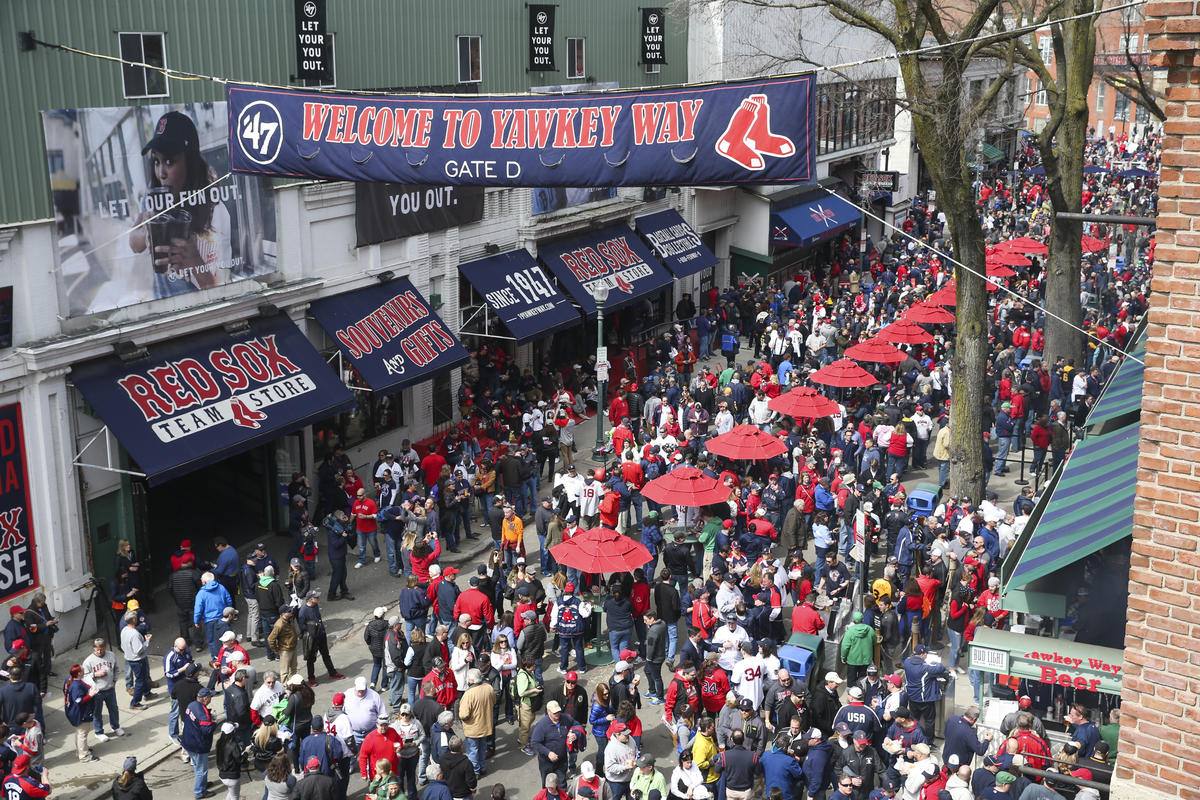
By Bob Nightengale |
This won’t change Boston’s reputation as one of baseball’s most racist cities, reinforced a year ago by the ugly incident involving Baltimore Orioles center fielder Adam Jones.
It won’t erase the Red Sox’s haunting history of being the last baseball franchise to integrate.
Yet, led by Red Sox co-owner John Henry, the Red Sox ensured that they no longer will honor or celebrate their racist past.
Former Red Sox owner Tom Yawkey’s name will be forever erased on the streets outside Fenway Park.
The Boston Public Improvement Commission made history Thursday by stripping Yawkey’s name off the two-block stretch around Fenway Park, returning to its original moniker: Jersey Street.
This doesn’t mean that we will forget how the Red Sox snubbed Jackie Robinson and Willie Mays, refusing to to integrate its team until 1959 – 12 years after Robinson’s arrival with the Brooklyn Dodgers.
It shouldn’t dull anyone’s memory either that the Red Sox had 45 managers in history, the same number as U.S. presidents, but have never employed an African-American manager or general manager.
This is the first season they’ve even had a minority manager, Alex Cora, a Puerto Rican.
Yet, after last year’s incident when a fan threw a bag of peanuts toward Jones – one of only 68 African-Americans on opening-day rosters this season – and berated him with racial slurs from the stands, the Red Sox took action that reverberated throughout baseball.
Henry, who came to the Orioles clubhouse the following day with Red Sox president Sam Kennedy and apologized to Jones, realizes that he can’t change the views of an entire citizenry. Racism will never completely go away. Yet, he can control how Red Sox history is celebrated and honored.
He immediately sought to rid the Red Sox of Yawkey’s legacy; the man who owned the Red Sox from 1933-1976 was called baseball’s biggest bigot by Robinson.
“When we arrived in 2002 one of the most important things we did was acknowledge the shameful past of the Boston Red Sox,’’ Kennedy said in the aftermath of the Jones’ incident. “They acknowledged this is the last team to integrate and there’s a reputation of not being the most friendly and hospitable environment. We’ve worked really hard to change that.’’
Now, in one swift decision, the Red Sox are breaking the celebratory link between Yawkey and all of his problematic beliefs.
“The undeniable and regrettable history of the Red Sox with regards to race and integration during the Yawkey stewardship,’’ Red Sox attorney David Friedman said at a February hearing, “make it difficult to give prominence to a symbol associated with an era marred by racial discrimination and inequality.’’
The Yawkey Foundation, which has donated $300 million to area organizations, is furious by the decision. The foundation argues that their patriarch wasn’t a racist. They deny the reports that Yawkey screamed a racial slur from the grandstands at a Red Sox workout with Robinson and two African-Americans.
“Tom Yawkey deserved to have his name live on at Fenway Park,’’ the Yawkey Foundation said in a statement. “We can’t change today’s decision, but we remain hopeful that he will be remembered as the good and decent man he truly was.”
His supporters say that Yawkey hardly was a pioneer for racial equality, but that he wasn’t David Duke, either. Still, it was clear that Yawkey enabled racism simply by not having a black player until the arrival of Pumpsie Green in 1959.
The Red Sox can’t expunge that fact from their history, but if nothing else, Yawkey’s legacy won’t be a constant reminder every time their fans walk through the turnstiles.
It was as if Yawkey Way was the Red Sox’s version of a confederate statue.
Now, the name is gone forever, and surely the plaque honoring Yawkey on the side of Fenway Park will be removed, too.
“Restoring the Jersey Street name is intended to reinforce that Fenway Park is inclusive and welcoming to all,’’ the Red Sox said in a statement.
Maybe one day the Red Sox will come up with a different name instead of Jersey Street too. The name honors the British Isle of Jersey where the local aristocracy bought and sold slaves.
If they want to truly celebrate the man responsible for change, maybe they should call it, Adam Jones Way. Jones, after all, is the one who had the courage to stand up for his beliefs, and publicly shame the Red Sox.
It’ll be fascinating to see if this prompts other organizations to react, examining their own troubled history. We have statues, plaques, street names and awards honoring racists throughout baseball. Maybe now organizations will feel comfortable enough to strip those honors.
Perhaps even the Baseball Writers Association of America can act, and change the name of its highest award. The BBWAA annually presents the J.G. Taylor Spink award to one of its members for meritorious contributions to baseball writing. The award is named after the long-time publisher of the Sporting News.
Yes, the same man who wrote an editorial in 1942 insisting there was no reason for baseball to integrate, saying that the game was better off having black players stay in the Negro Leagues.
Now, here are the Red Sox, changing the name of a street because of its racial connotation, just a month after the Cleveland Indians stopped using their Chief Wahoo logo.
Perhaps this is the start of a trend, and after decades of disgraceful behavior, we can thank the Red Sox for being at the forefront of a movement, and end honoring those who accepted, or even emboldened baseball’s ugly racial history.
Shame has turned into opportunity.
This article was republished with permission from the original publisher, USA Today. Follow Bob Nightengale on Twitter and Facebook.